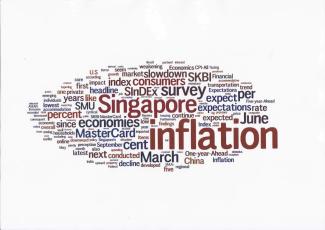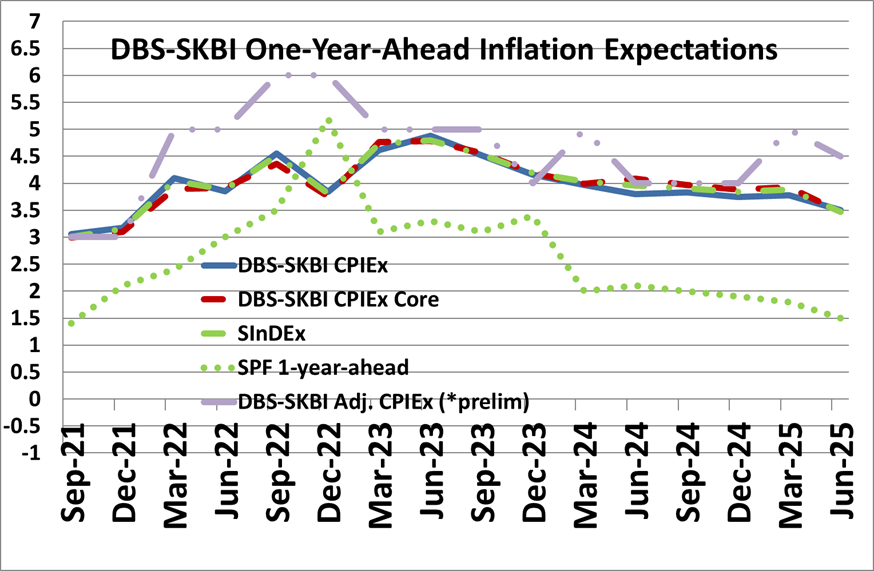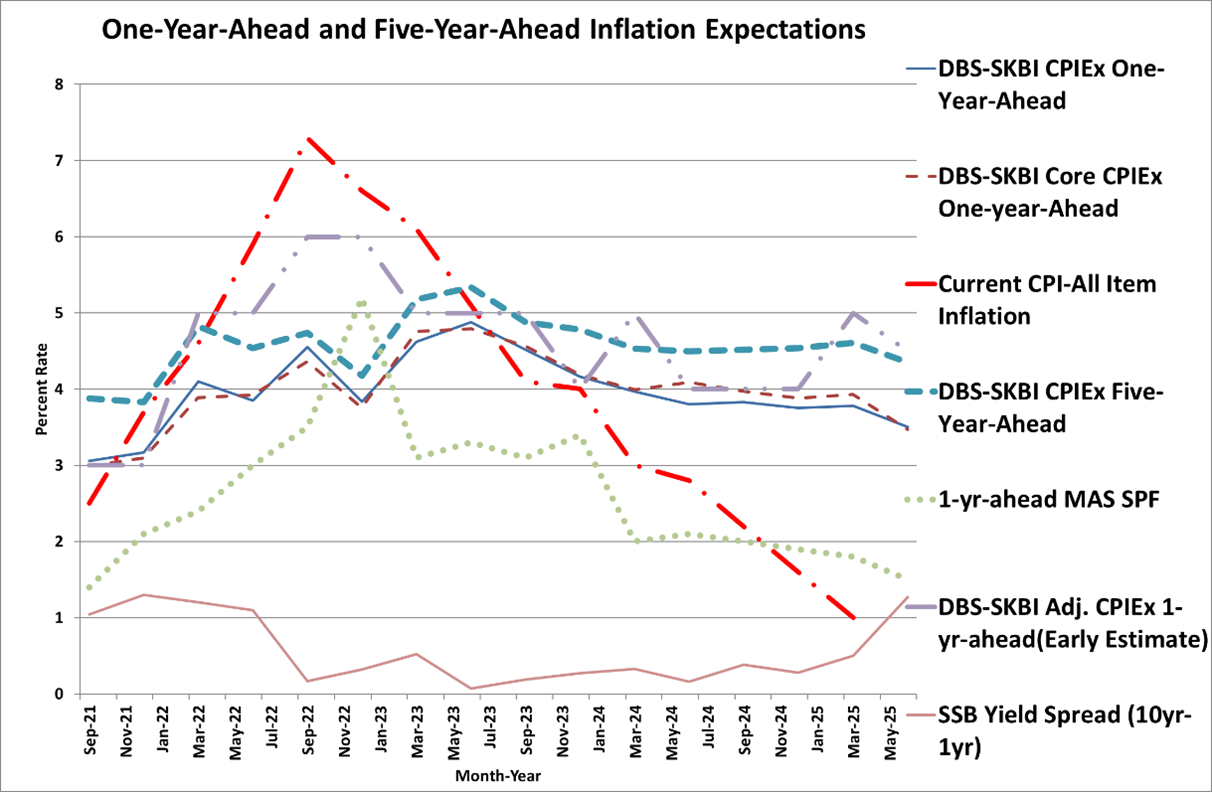
SINGAPORE, 22 July 2025 (Tuesday) - These are the research findings of the 56th round of the DBS-SKBI Singapore Index of Inflation Expectations (SInDEx) Survey at the Sim Kee Boon Institute for Financial Economics (SKBI), Singapore Management University (SMU), conducted between 23 and 29 June 2025.
- One-year-Ahead headline inflation expectations dipped to 3.5% in June 2025 from 3.8% in March 2025, their lowest level since December 2021. Consumers’ headline inflation expectations (CPIEx) which had remained flat since the June 2024 survey, moderated down in the June 25 survey. The second quarter One-year-Ahead inflation expectations were slightly above the average second quarter One-year-Ahead headline inflation expectations of 3.4% since the inception of this index in the third quarter of 2011.
- As a comparison benchmark, data from the Monetary Authority of Singapore Survey of Professional Forecasters (MAS SPF) released in June 2025 (based on May 2025 data) showed that the median forecast of the Consumer Price Index (CPI)-All Items inflation for 2025 (quarterly) was 0.9% (1.5% for 2026), while MAS Core Inflation median forecast was 0.8% (1.5% for 2026) (MAS SPF June 2026, Table 2 and Table A.5). The latest CPI data released by the Department of Statistics (DOS) showed that CPI-All Items rose by 0.9% between January and May 2025, compared to the same period in 2024. The latest May 2025 monthly headline or all item inflation print came at 0.8% year-on-year, while the MAS Core Inflation Measure was 0.6% (DOS CPI, May 2025). The base year was changed to 2024 with the adjustment of the consumption baskets based on the Household Expenditure Survey 2023. In their first two quarterly reviews of 2025, MAS reduced slightly the rate of appreciation of the Singapore Dollar Nominal Effective Exchange Rate (S$NEER) policy band, implementing two consecutive loosening moves after having maintained the prevailing rate of appreciation since October 2022 (MAS Monetary Policy Statements, January 2025 and April 2025). The next monetary policy statement will be announced by July 2025.
- The overall aggregated Consumer Price Index Inflation Expectations, re-combining across components after addressing potential component-wise behavioural biases, declined marginally to 4.9% in June 2025 compared to 5% in March 2025. One-year-Ahead inflation expectations of major components of CPI mostly remained unchanged or declined, namely in components like Food (unchanged at 5%), Transportation (unchanged at 5%), Housing & Utilities (unchanged at 5%), Healthcare (unchanged at 5%), Education (unchanged at 5%), Household Durables & Services (unchanged at 5%), Recreation, Sport & Culture (declined to 4% from 5%), Clothing & Footwear (declined to 4.3% from 5%), Information and Communications (declined to 4% from 5%) and Miscellaneous Goods & Services including Personal Care (unchanged at 5%). With seven out of 10 categories of component-based inflation expectations staying flat, and three categories declining, there seems to be some stability on the horizon despite geopolitical and policy uncertainty and potential risks of a trade war.
- The survey team also polled free-response overall inflation expectations, after reducing potential behavioural biases by informing respondents of current aggregated economic data. We found that the One-year-Ahead headline inflation expectations moderated down to 4.5% in June 2025, compared to 5% in March 2025. These free-response polls help us gauge perceptions of the anchoring of inflation expectations and consumer sentiments in an aggregated sense.
- In the June 2025 survey, continuing since June 2022, we took a more forward-looking approach in analysing the impact of global economic developments on Singapore’s economic growth and inflation.
- Overall, responding to multiple sources of uncertainty and fragilities in the global order, including ongoing conflicts, strategic geopolitical tensions and policy uncertainty affecting global trade, including the potential of a trade war in a fragmented world, Singaporean consumers surveyed in June 2025 expected a slight negative impact on the country’s economic growth over the next 12 months.
- In addition, Singaporean consumers also opined in the June 2025 survey that over the next 12 months, their overall expenses are expected to increase slightly. Nonetheless, in response to a new question added in the June 2025 survey, respondents believe that their household situation is expected to be slightly better-off financially in the next 12 months.
- In the June 2025 survey, around 50.3% (compared to 44.4% in March 2025) of Singaporeans surveyed expect inflation to decline in the medium term of one year. On the other hand, 42.4% (compared to 44.4% in March 2025) felt that One-year-Ahead inflation will increase. This seems to indicate that more respondents expect a decline in One-year-Ahead inflation expectations, breaking a virtual dead heat in March 2025 survey, where equal proportions of respondents expected inflation to go up or down.
- In June 2025, the main reason cited by those expecting inflation to decline is the slowdown in global growth (34.7%). This is followed by the uncertain impact of trade policies (29.6%) and the role of central banks in keeping interest rates high (12.4%). Among respondents expecting inflation to increase over the next 12 months, there was a greater variety of perceived reasons. The most common one cited was high demand due to geopolitical uncertainties due to the conflicts involving Hamas and Israel, Ukraine and Russia and Iran and Israel (28.1%), followed by the relaxation of pandemic-era measures (17.7%), the impact of higher interest rates by the central banks of major economies (16.5%) and higher trade policy uncertainty due to tariffs (15.2%) and supply chain disruptions (11.7%).
- In the June 2025 survey, respondents opined that under current economic conditions, they expect the One-year-Ahead and Five-year-Ahead overall inflation expectations to slightly increase. Component-wise, respondents expect inflation related to Food, Transport, Housing & Utilities, Healthcare will increase slightly, with no discernible impact on Education, Household Durables & Services, Recreation, Sport & Culture, Information & Communication, Clothing & Footwear, and Miscellaneous Goods & Services.
- Alberto Cavallo of Harvard Business School (Cavallo, 2020) and European Central Bank (Kouvavas et al., 2020) highlighted potential biases in CPI calculations with fixed baskets as respondents made substantive changes to their consumption baskets owing mainly to the COVID-19 pandemic. In the June 2025 survey, Singaporean consumers polled that in the next 12 months, they expect a slight increase in the budget share of Housing and Utilities, but no change in that of Food, Transport, Healthcare, Household Durables and Services, Education, Recreation, Sport & Culture, Clothes and Footwear, Information and Communications and Miscellaneous Goods & Services. These results indicate that respondents expect their consumption baskets to stay mostly the same over the next 12 months, with a higher budget share on certain components like Housing and Utilities. This change in budget share can potentially be due to more permanent changes in consumption behaviour and lifestyle in the post-pandemic era, like the practice of working from home regularly or ordering groceries online. Also, the base year was changed to 2024 with the adjustment of the consumption baskets to take into account the Household Expenditure Survey 2023. This might have addressed some of these changes.
- Excluding the volatile components of Accommodation and Private Transportation, the One-year-Ahead CPIEx core inflation expectations in the SInDEx survey dropped to 3.5% in June 2025 from 3.9% in March 2025.
- For a subgroup of the population who owns their accommodation and uses public transport, the One-year-Ahead CPIEx core inflation expectations also dropped from 4% in March 2025 to 3.4% in June 2025. This sub-sample measurement is potentially more representative and hence more accurate than the full sample measurement, due to high home ownership and public transport ridership in Singapore.
- Unlike the fixed radio-button response which might be susceptible to various behavioural biases, the free-response core CPIEx Inflation Expectations (excluding Accommodation and Private Transportation expenses) declined slightly. After adjusting for potential component-wise behavioural biases and re-combining across components, the core-CPIEx Inflation Expectations (excluding Accommodation and Private Transportation expenses) pared from 5% in March 2025 to 4.8% in June 2025. The free-response core CPIEx, however, stayed unchanged at 5% in June 2025 compared to March 2025. Despite having made accommodations for some behavioural bias, free responses are susceptible to higher fluctuations during higher levels of uncertainty. A more representative and responsive measure of household cost experiences might be the core per capita consumption expenditure (core PCE) preferred by central banks like the Federal Reserve Board.
- The One-year-Ahead composite index SInDEx1 that puts less weight on more volatile components like Accommodation, Private Road Transport, Food and Energy-related expenses also declined from 3.9% in March 2025 to 3.5% in June 2025. It continued to be higher than the second quarter’s average of 3.5% since the inception of the survey in 2011.
- In addition, in a sign of a slight decline in the job outlook, 4.8% of Singaporeans in the June 2025 survey expect a more than 5.0% reduction in salary in the next 12 months. This is slightly higher than the 3.8% polled in the March 2025 survey. The expectation of median salary increments in June 2025 of between 1.0% and 5.0% remained unchanged, compared to March 2025 survey.

DBS Bank Chief Economist and Managing Director of Group Research, Dr Taimur Baig commented, “A welcome albeit mild disinflationary trend is underway in Singapore, helped by some easing of energy prices and overall mildness in the demand environment. Concurrently, inflation expectations have continued to ease modestly. Trade war-related demand and investment uncertainty are driving this, as evident from the survey readings. We expect this trend to continue for the rest of the year.”
Dr Aurobindo Ghosh, Assistant Professor of Finance at Singapore Management University (SMU), the creator and the Principal Investigator of the Quarterly DBS-SKBI SInDEx Project, observed, “The global economy has been going through significant upheavals and realignments in the light of the April 2 ‘Liberation Day’ announcement by the current US Administration on a slew of tariffs, followed by deadlines for negotiations. This ushered in an unprecedented period of uncertainty on global trade flows. As a small, open trade-dependent economy, Singapore consumers, businesses and policymakers have been eagerly waiting to see the impact as the dust settles on ongoing trade negotiations. The International Monetary Fund (IMF) has forecast a paring of global growth in 2025 in the light of the new policy uncertainties, though they see an improvement in growth forecast for 2026.
The DBS-SKBI SInDEx survey, which serves as a barometer of perceptions of a representative cross-section of Singaporean residents, has revealed certain interesting insights. Some 50.3% respondents opine that the One-year-Ahead inflation expectations will decline, mainly due to subdued global growth. However, it is noteworthy that nearly double the respondents feel the global trade tariffs that could potentially be imposed by the United States is deemed to lower inflation in Singapore in the medium term (29.6%) than increase it (15.2%). The quarterly SInDEx survey also reveals that the One-Year-Ahead Headline Inflation Expectations declined in June 2025, after having been steady since June 2024. This decline was also evident in respondents’ expectations of the Singapore MAS core rate, excluding accommodation and private transportation costs, after partially accommodating for behavioural biases in survey-based instruments (Clark, Ghosh and Hanes, 2018).”
“In addition, in 2025, with the change of base of the Consumer Price Index (CPI) to 2024 and consumption baskets based on the 2023 Household Expenditure Survey (HES 2023), respondents opined that their consumption basket is expected to remain largely unchanged except for a higher portion for housing and utilities (Cavallo, 2020, Kouvavas et. al.,2020, Weber et. al., 2022). Finally, despite expecting to pay slightly more, respondents believe that their household's overall financial situation is expected to be slightly better off in the next 12 months compared to the previous year,” Dr Ghosh noted.
For the longer horizon, the Five-year-Ahead CPIEx inflation expectations pared to 4.4% in June 2025 compared to 4.6% in March 2025. The current polled number continues to be slightly higher than the second-quarter average of 4.2% polled since the survey’s inception in September 2011.
The Five-year-Ahead CPIEx core inflation expectations (excluding costs related to Accommodation and Private Transportation) also declined to 4.2% in June 2025 from 4.5% in March 2025. Overall, the composite Five-year-Ahead SInDEx5 also declined to 4.3% in June 2025 from 4.6% in March 2025. In comparison, the second-quarter average value of the composite Five-year-Ahead SInDEx5 is 4.1%, from the survey’s inception in September 2011 up till 2024.
After adjusting for potential behavioural biases, the free-response Five-year-Ahead Headline Inflation Expectations remained unchanged at 5% in June 2025 compared to March 2025.
Dr Aurobindo Ghosh added, “In June 2025, SInDEx survey respondents polled long-term inflation expectations for the Five-year-Ahead Headline and Core Inflation Expectations have declined compared to the March 2025 survey. Even after adjusting for behavioural biases, the long-term headline inflation expectations remained flat for the fifth quarter in a row after declining over the previous four quarters. Despite short-term fluctuations due to policy uncertainty on trade, this reflects some element of anchoring of longer-term inflation expectations and therefore corroborates academic findings of the importance and accuracy of survey-based measures (Ang, Baekert and Wei, 2007).”
References:
Ang, A., G. Bekaert, and M. Wei., 2007, “Do Macro Variables, Asset Markets, or Surveys Forecast Inflation Better?” Journal of Monetary Economics, 54:4, pp. 1163–212.
Cavallo, A., 2020, "Inflation with COVID Consumption Baskets." NBER Working Paper Series, No. 27352, June 2020 (Harvard Business School Working Paper, No. 20-124, May 2020). (https://www.hbs.edu/faculty/Pages/item.aspx?num=58253, accessed on July 14, 2020)
Clark, A., A. Ghosh and S. Hanes, 2018, “Inflation Expectations In Singapore: A Behavioural Approach,” Macroeconomic Review, Vol 17:1, pp. 89-98.
Household Expenditure Survey (2023): (https://www.singstat.gov.sg/-/media/files/publications/households/hes20…, accessed on July 17, 2025)
Kouvavas, O., R. Trezzi, M. Eiglsperger, B. Goldhammer and E. Goncalves, 2020, “Consumption patterns and inflation measurement issues during the COVID-19 pandemic,” ECB Economic Bulletin, Issue 7/2020. (https://www.ecb.europa.eu/pub/economic-bulletin/html/eb202007.en.html#toc6, accessed on July 14, 2020)
MAS Monetary Policy Statement- January 2025 and April 2025, (https://www.mas.gov.sg/news/monetary-policy-statements/2025/mas-monetar…, accessed on Oct 17 2024; https://www.mas.gov.sg/news/monetary-policy-statements/2025/mas-monetary-policy-statement-14apr25, accessed Apr 17, 2025)
MAS Survey of Professional Forecasters (MAS SPF), (https://www.mas.gov.sg/-/media/mas-media-library/monetary-policy/mas-su…, accessed on July 17, 2025)
Singapore Consumer Price Index Press Release (DOS CPI), Singapore Department of Statistics (https://www.singstat.gov.sg/-/media/files/news/cpimay25.ashx, accessed on July 17, 2025)
Weber, M., F. D’Acunto, Y. Gorodnichenko and O. Coibion, 2022, “The Subjective Inflation Expectations of Households and Firms: Measurement, Determinants, and Implications,” Journal of Economic Perspectives, 36:3, pp. 157–184.
Methodology
DBS-SKBI SInDEx survey yields CPIEx Inflation Expectations (estimating headline inflation expectations) and related indices are products of the online quarterly survey of around 500 randomly selected individuals representing a cross section of Singaporean households. The survey is led by Principal Investigator Dr Aurobindo Ghosh, Assistant Professor of Finance (Education) at Lee Kong Chian School of Business of the Singapore management University. The online survey, powered by Agility Research and Strategy, helps researchers understand the behavior and sentiments of decision makers in Singaporean households. DBS Group Research is a co-sponsor and research partner with the Sim Kee Boon Institute for Financial Economics (SKBI) at SMU.
The quarterly DBS-SKBI SInDEx survey has also yielded two composite indices, SInDEx1 and SInDEx5. SInDEx1 and SInDEx5 measure the One-year inflation expectations and the Five-year inflation expectations, respectively. The sampling was done using a quota sample over gender, age and residency status to ensure representativeness of the sample. Employees in some sectors like journalism and marketing were excluded as that might have an effect on their responses to questions on consumption behavior and expectations.
The DBS-SKBI SInDEx survey was augmented in June 2018, based on a joint research study conducted by SMU researchers in collaboration with MAS and the Behavioural Insights Team, where respondents were polled on their perceptions of components of the Consumers Price Index (CPI) and adjusted for possible behavioural biases prevalent in online surveys.
Based on the recommendations of the joint study, since March 2019 the research team has polled the One-year-Ahead inflation expectations of all of the major components of CPI-All Items inflation. For the June 2025 survey, DBS-SKBI CPIEx One-year-Ahead headline inflation expectations indices declined from March 2025. The core inflation expectations also declined in June 2025. The behaviourally adjusted component-wise and recombined inflation expectations also followed a similar decline in June 2025 compared to March 2025. In free-response answers, compared to March 2025 survey, responses in the June 2025 survey polled for One-year-Ahead Headline declined slightly, although the core Inflation Expectations remained unchanged. Overall, the results indicate a general decline of both medium-term (One-year-Ahead) and long-term (Five-years-ahead) inflation expectations.
